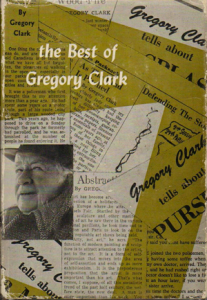For the next several weeks, we will republish our favorite “Reading Lessons” columns from this year, before our next column debuts.

Late in his career, Gregory Clark received a letter from one Geo. McAllister. “Do you think it is fair for a man like you to pretend life is so interesting?” McAllister wrote. “I bet you make most of it up.”
Even as a teenager, I could see where McAllister was coming from. I was barely in high school when, adrift in front of my parents’ bookshelves on a rainy afternoon, I pulled down a slim green volume without its dustjacket, The Best of Gregory Clark. If you’re a Canadian beyond your middle years, you know who Clark was, either because you read him yourself or because your parents talked about him: a reporter and humorist who’d fought in World War I, covered World War II, was a devoted outdoorsman—“A sportsman,” his father had advised him, “is one who not only will not show his own father where the best fishing holes are, but will deliberately direct him to the wrong ones”—and a wise, compassionate observer of everyday life on the street, in the endless Canadian woods, and, literally, in the trenches.
It seems odd that a man writing about Canada in the early and mid-20th century could open up a world—his essays about immigrants concerned such exotics as newly arrived Dutch and Scotsmen—but that is what Clark did. His gift was to show life through both ends of a telescope: small events revealed big truths, big events drew within grasp through the tiniest details. A robin that almost upstaged FDR’s funeral. His Ojibway guide’s evening ritual of reciting every detail of the day that had just passed. A brief encounter with a traumatized young Frenchwoman who’d had the misfortune to fall in love with a German solider—and its reverberation years later.
As I grew older, one essay stuck with me: his response to McAllister. On leave in London during the first war, not having seen his family for years, Clark was dining alone in a crowded restaurant when he suddenly heard his brother laugh. I won’t tell you the rest except to say that he didn’t react as you or I would have. He figured out how to construct a story on the spot. “You see, McAllister?” he wrote. “It is all a little trick. You MAKE memory. Out of little, passing, trivial, joyous things.” Clark had the knack, and I’ve envied it ever since. You will, too.

